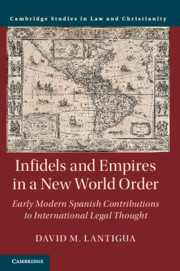 Infidels and Empires in a New World Order
Infidels and Empires in a New World Order Book contents
- Infidels and Empires in a New World Order
- Law and Christianity
- Infidels and Empires in a New World Order
- Copyright page
- Dedication
- Contents
- Figures
- Acknowledgments
- 1 Introduction: International Relations Beyond Westphalia
- Part I The New World Crucible of Infidel Rights
- Part II God, Empires, and International Society
- Bibliography
- Index
1 - Introduction: International Relations Beyond Westphalia
Published online by Cambridge University Press: 11 June 2020
- Infidels and Empires in a New World Order
- Law and Christianity
- Infidels and Empires in a New World Order
- Copyright page
- Dedication
- Contents
- Figures
- Acknowledgments
- 1 Introduction: International Relations Beyond Westphalia
- Part I The New World Crucible of Infidel Rights
- Part II God, Empires, and International Society
- Bibliography
- Index
Summary
This introductory chapter presents the Valladolid junta in imperial Spain (1550-1551) as an alternative starting point for the history of international legal thought instead of the 1648 Peace of Westphalia. Unlike Westphalia’s myth of equal states recognizing independence from the emperor and papacy within Europe, the Valladolid debate addressed the controversial question of legitimate infidel polities outside Europe. By focusing on native peoples on the colonial margins of transatlantic Christendom, the chapter reframes international relations from the periphery rather than strictly Europe. A more interesting story emerges, revealing that Christian-infidel relations and its discourse of infidel rights was an ambivalent predecessor to a modern international relations marked by recognition of independent sovereign states and colonial subjugation of less civilized ones. Accordingly, the chapter accomplishes two tasks: it reconsiders the Westphalian myth by examining the international politics of Thomas Hobbes attentive to his influential idea of the state of nature; it also treats significance of theology and the Church for affirming world order - the normative basis of international society - especially among sixteenth-century Spanish Dominicans associated with Valladolid critical of papal and imperial tyranny.
Keywords
- Type
- Chapter
- Information
- Infidels and Empires in a New World OrderEarly Modern Spanish Contributions to International Legal Thought, pp. 1 - 28Publisher: Cambridge University PressPrint publication year: 2020
